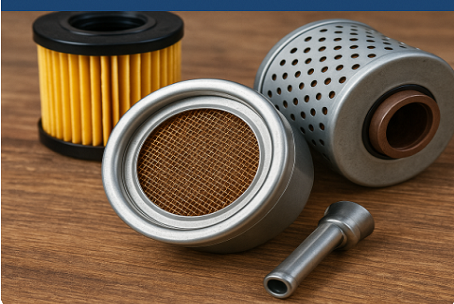Fuel filters are essential components in engine systems. They prevent contaminants in the fuel—such as rust, dirt, and moisture—from entering high-precision fuel injection systems. Without effective filtration, these impurities can lead to premature wear of components like injectors and fuel pumps, resulting in reduced engine performance, increased maintenance costs, and shorter service life.
Among various filter materials, mesh media stands out for its structural stability and controllable pore sizes, making it a popular choice in fuel filter applications.
Material | Key Features |
Stainless Steel Mesh | High corrosion resistance, heat resistance, pressure tolerance, reusable |
Brass Mesh | Flexible, easy to process, moderate corrosion resistance |
Nylon Mesh | Chemically resistant, smooth surface, fine filtration |
Synthetic Fiber Media | Disposable, high dirt-holding capacity, low cost, not washable |
Made from SUS304 or SUS316 stainless steel wire, this material offers superior corrosion resistance, high temperature resistance, and excellent pressure tolerance. Its uniform pore size ensures consistent filtration performance. Stainless steel mesh can be cleaned and reused multiple times, maintaining stable filtration efficiency over its lifespan.
Manufactured from copper-zinc alloy wire, brass mesh is flexible, easy to process, and corrosion-resistant. However, it is less durable under high temperatures and mechanical stress, making it more suitable for low-demand filtering applications.
Woven from nylon monofilament, this mesh is chemically resistant, smooth-surfaced, and easy to clean. It can achieve fine filtration and is often used in food-grade or pharmaceutical settings. Its drawback lies in poor resistance to heat and pressure, limiting its use in high-demand fuel systems.
Typically made from polypropylene or polyester fibers, this non-woven material is used in disposable filter cartridges. It has a high dirt-holding capacity and low cost but is not washable and degrades in harsh environments. It's ideal for systems with moderate filtering demands and shorter lifespans.

Stainless steel mesh filters offer numerous benefits:
· Strength and Durability: Withstands high pressure and vibration in fuel systems. Maintains shape and pore structure even under sudden pressure fluctuations and high flow rates.
· Corrosion and Heat Resistance: Performs reliably in harsh environments, including those with acidic or alkaline fuel compositions and elevated temperatures.
· Reusability: Can be easily cleaned (e.g., via backflushing or solvent washing) and reused multiple times, which reduces maintenance costs and waste.
· Consistent Performance: Precise pore control ensures stable flow rates and effective particle retention across its service life.
· Customizable Filtration Precision: Mesh sizes range from coarse (4 mesh) to ultra-fine (400 mesh), allowing engineers to choose filtration levels that best suit the system’s sensitivity and contamination levels.
Jiushen Wire Mesh Products Co., Ltd. offers a wide variety of stainless steel fuel filters made from high-grade SUS304 and SUS316 materials. Our filters are available in forms such as mesh discs, cylindrical elements, and welded assemblies, tailored to different equipment types and installation conditions.
· Multi-layer sintered mesh
· Woven wire mesh
· Disc-style filters
· Basket filters
· Automotive fuel systems (gasoline, diesel, hybrid)
· Marine diesel engines
· Agricultural machinery (tractors, harvesters)
· Industrial equipment (generators, compressors, construction machinery)
Jiushen filters are designed for compact size, easy installation, and user-friendly maintenance. We offer full customization of shape, size, mesh count, and connector types to meet diverse customer needs. Our goal is to provide efficient and reliable filtration solutions that enhance fuel system protection and performance.
Jiushen stainless steel mesh fuel filters deliver superior durability, high filtration precision, and long-term cost-effectiveness. They are ideal for high-performance engines and industrial applications where stable, reusable, and corrosion-resistant filtration is critical. With a wide range of configurations and mesh sizes available, Jiushen can meet the needs of OEMs, distributors, and end users worldwide.
For inquiries or custom solutions, please contact us directly.
Q1: What mesh is commonly used in fuel filters?
A1: Stainless steel wire mesh is one of the most commonly used materials in high-quality fuel filters. Typical mesh sizes range from 80 mesh to 200 mesh, depending on the filtration requirements. For finer filtration, manufacturers may use up to 300–400 mesh, especially in high-precision fuel injection systems.
Q2: Why is stainless steel mesh preferred over other materials?
A2: Stainless steel mesh offers excellent corrosion resistance, mechanical strength, and thermal stability, making it ideal for harsh environments like automotive, marine, and industrial fuel systems. Unlike synthetic or fiber media, it is washable and reusable, helping reduce long-term maintenance costs.
Q3: Can the mesh size be customized for specific fuel systems?
A3: Yes. Jiushen offers customizable mesh sizes and filter configurations based on your system’s needs—whether it's for coarse filtration (e.g., 60–80 mesh) or fine filtration (e.g., 200–400 mesh). Our engineering team will help design the optimal solution.
Q4: How does mesh size affect filtration performance?
A4: The mesh size determines the particle size the filter can trap. For example, a 100 mesh screen can typically filter out particles around 150 microns. Smaller mesh sizes (higher mesh numbers) trap finer particles, but may slightly reduce flow rate, so a balance between flow and filtration precision is key.
Q5: Is stainless steel mesh suitable for modern engines?
A5: Absolutely. Modern engines, especially those with high-pressure fuel injection, require precise and stable filtration. Stainless steel mesh offers the consistency, durability, and filtration accuracy needed for such systems, ensuring long-term engine protection.
Q6: What mesh does Jiushen use in its fuel filters?
A6: Jiushen typically uses SUS304 or SUS316 stainless steel mesh, with mesh counts ranging from 80 to 300, depending on the application. All mesh materials are precision-woven and tested for durability, flow rate, and filtration efficiency before delivery.
Copyright © Hebei Jiushen Wire Weaving Co., Ltd. All Rights Reserved. |
Sitemap
| Technical Support:
